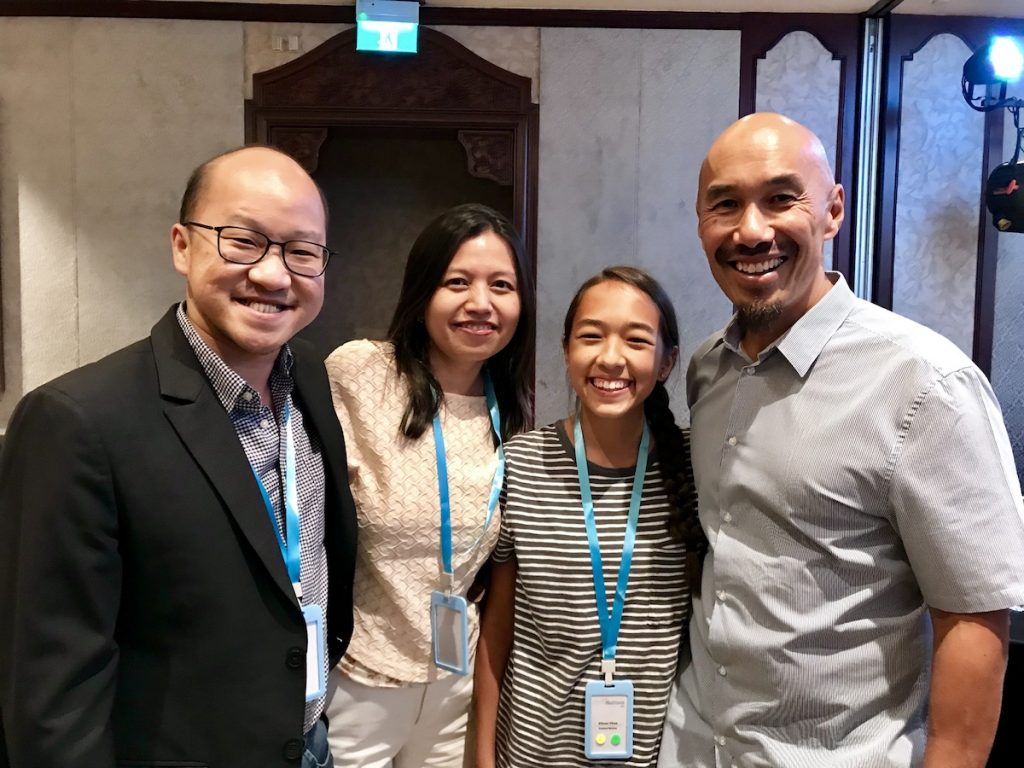
Meeting Francis
My husband and I met Francis Chan at a conference in Jakarta last year. We have read his bestseller book, Crazy Love, and have been loosely following his life story. In the conference, he announced that he would move his family to Hong Kong in early 2020. He had gone on a mission trip to Myanmar sometimes before, and he realized there were more gospel needs in Asia than in the U.S. The churches in the U.S. already have a lot of resources from sermons, books, blogs and podcasts. He felt his presence in Asia could contribute more to the spread of the gospel.
I remembered I was taken aback when I heard his decision to move. He already has an established ministry and reputation in the U.S., which he can leverage for great projects and endeavors. Right away, I imagined how it might have felt for Lisa, Francis’ wife, to uproot the entire family and minister in an unfamiliar country, language and culture.
Francis sweetly shared that on their recent anniversary, his wife felt she was the happiest person on earth. My husband whispered to me, “That’s the greatest compliment a husband could ever hope for!” Francis’ story gave me a glimpse of how fulfilling marriage can be when both husband and wife are walking together in rhythm following God.
Another surprising news I read recently is Francis has just discovered the gift of healing. He spoke up about how he used to make fun of the healing ministry. My husband and I also came from a faith tradition that is not familiar with the Holy Spirit’s manifestations in the forms of speaking in tongues or miracle healings. Yet we want to be sincere in our quest for God’s truths and His ways and not limit God’s work based on our abilities to comprehend and experience.
Francis’ moves have raised some concerns and uneasiness within the evangelical community, and some question if he has started a journey towards apostasy. Francis also received a backlash when he shared a stage with Benny Hinn in a conference. He defended his reason in a Christianity Today’s article (I provide the article links below).
In one interview, Francis was asked if he wanted to switch camps, now that he was more open to speaking in tongues and healing ministry. He said no, he just wanted to be free to follow wherever the Holy Spirit led him, irrespective of denomination. Francis’ statement stirred up more questions for me. How should I interpret
I am not a Bible scholar, so I will not go into a theological discussion in this article. I will share some lessons about perspective bias from my personal and spiritual life, which might help digest and further our walk with God.
Disposition Towards Perspective Bias and Judging
According to the Myers-Briggs personality assessment, my judging attribute scores much higher than my perceiving attribute. That means I am not comfortable in situations in which I cannot quickly assess and make conclusive judgments if a thing in question is good, bad
I will be the first to admit there is virtue in predictability. Predictability soothes us. We flourish under rhythm and stability, which is part of God’s wiring in us. The impressions of things under control and already figured out have curative and calming properties. But these impressions experienced through our fallen nature can create a sense of self-sufficiency apart from God.
As I grapple with my ways in life, I cling to my judgements as guideposts. They help me navigate my surroundings and give me a sense of security. Yet age and experience have taught me that this “guidance system” is an illusion. They are crumbly guideposts because I don’t have the rigor and the capacity to arrive at the most objective understanding, even if I want to. I figure better to have these pseudo-solid pillars of thoughts that can provide some perspectives than have nothing at all.
After setting up my “guideposts,” I usually plan my course and venture off on my own, instead of waiting on the Holy Spirit’s guidance. My
Another natural weakness of my personality type is blind spots. Because I am so focused on my personal “guideposts,” I can hurt others by my lack of ability to really appreciate and understand different views.

A More Balanced Approach for Spiritual Understanding
Romans 12:6: Live in harmony with one another. Do not be haughty, but associate with the lowly. Never be wise in your own sight.
In the realm of spiritual life, a missionary once gave me this wise advice. To maintain one’s spiritual health as “sheep*,” we sometimes need to graze from different pastures, not only consuming from the same plot of field. He meant it is good to have exposure to other types of teachings and ways of worshiping God that differ from our primary way.
*) This is a Christian reference: we refer to ourselves as sheep and God as our Shepherd.
“A man who has lived in many places is not likely to be deceived by the local errors of his native village.”
C.S. Lewis in The Weight of Glory
My friend and I attended a seminar taught by Richard Pratt at a Reformed seminary last year. Mr. Pratt told us that every church has its own blind spots. How to maintain a more balanced perspective is by implementing narrow identification and broad association. What he meant was we align ourselves with a particular denomination, but we also maintain meaningful connections and cooperation with the broad Christian evangelical community.
So we are still a resident in our “native village,” we still subscribe to some basic tenets of Christianity, and we still identify with one specific denomination and local church body. Yet, we need not be afraid to associate ourselves with other believers from different denominations, and even learn from them. We will stumble upon some differences on some matters, and we will learn to tread carefully and wisely.
If we continue studying the Word diligently, consulting with other trusted mature believers and seeking the Holy Spirit’s leading in interpretations, God will not let us go astray. Fears should not hinder us from associating broadly. The practice of broad association has enriched me and made my understanding deeper of the nuances of the Spirit’s work.
Two heads are better than one, not because either is infallible, but because they are unlikely to go wrong in the same direction.
I discovered an interesting parallel with the classical education pedagogy. I homeschool my daughters using the Classical Christian curriculum. In this curriculum, we are required to read a lot of classic books along with contemporary books. The reasoning behind this is because every age has its outlook about life, so by reading books from different eras, we can have a more accurate and wholistic perspective of life.
Every era is specially good at seeing certain truths and specially liable to make certain mistakes. In summary, every era of human history is wrongly affected in a different way.
Another quote from C. S. Lewis about the benefits of reading old books: “Every culture or era goes wrong, but the era doesn’t go wrong in the same ways. We tend to blend with the errors of our times. The old books that will be a corrective to our present misguided concepts and ideas.”
Perspective bias usually lurks its head in the ways we do things when we become too rigid, critical and exacting in our methods and ideas. Having a breadth of associations with different denominations helps avoid perspective bias, and hopefully, our view of God becomes more wholistic.
We should be comfortable and content between standing on the bedrock of truths clearly revealed in His Word and maintaining the posture of perceiving for more truths to be revealed. We are careful not to be exacting on non-dogmatic issues because it can hurt other brothers and sisters in faith.

Living Step by Step in Love
I know God is beyond our comprehension, and He can’t be boxed. There are many avenues to encounter, understand and experience God. He comes to where we are, and He engages with us according to our personalities too.
My personality type is very keen on following sets of guidelines or rules for predictable outcomes. Do I remind you of a particular group of people in the gospel? Yes, The Pharisees. Unfortunately, I can identify with them more than with Mary of Bethany. Their intense nature and quest for knowledge are larger than the desire to sit quietly at the Lord’s feet, learning and absorbing in the moments.
We who imitate the Pharisees also inherit the Pharisee Pride. I have my shares of regrets of hurting other believers because of my overzealousness to shield myself from possibly any shades of heresy (or so I thought). If I think I already figured out God, I am bound to make mistakes.
If we stop perceiving and communing with God, if we rely too much on our preconceived ideas and judgments, and if we are overzealous with our notions and understandings of God, we will miss Him and His work. A notable exception of the Pharisee is Nicodemus. He kept seeking God; thus, he was one of the few Pharisees who could recognize Jesus as God. I sometimes imagine myself as one of the Pharisees during Jesus’ time and wonder if I would be more likely to recognize Jesus as the promised Savior or not. Sadly, maybe not.
I also envision it was not an easy feat to be the Israelites on their way to the Promised Land. They were not given a map to assess the situations, to estimate and to plan. They had to get up, packed up and be ready whenever they saw the pillars of cloud or fire moved at unexpected times. They didn’t know how long they would stay in one place, could be days, weeks or months, and then they would move again.
Sure, they witnessed many miracles, but there was no guarantee that God would deliver them in the same way every time. One time God might give them water from a rock. Another time God might want them to hold out for a few more days or look for and dig the water themselves. They never knew what the future would hold.
There was no pattern that can be replicated. God can’t be boxed and figured out, which stresses and frustrates us, but which makes Him God. We can’t calculate His moves and approximate His ways.
The Israelites needed to learn to walk before Him literally step by step while maintaining confidence and hope for the future despite so many unknowns and uncertainties. Unknowns and uncertainties challenge, exhaust and pain us, but the pain triggers learning, growth and breakthroughs.
Like the Israelites, we can’t comprehend many facets of God, but we try to follow Him faithfully step by step as best we know how. God doesn’t give us the map, but He gives His Spirit to dwell within us.
Nehemiah 9:20: You gave your good Spirit to instruct them.
My soul needs to be in a perpetual state of perceiving and unassuming, always ready to recognize the Spirit’s prompts and guidance whenever He chooses to reveal things to me. Just like parents don’t dump all information and knowledge to a child when the child is not ready to receive it, God also only reveals things when it is appropriate in our process towards maturity in Christ.
Similarly, like parents with more than one child, the parents usually relate differently to each child, depending on the child’s personality, life experiences and the parent’s plans for the child. If the child shares notes with his or her siblings, they can get a fuller understanding of their parents.
The parent is not being contradictory or relativistic, but the child with his or her uniqueness and limitations simply cannot conceive the many facets of truth from the parent. God gives us the Holy Spirit to walk alongside us and “customize” the delivery of His truths in our lives.
Ephesians 4:13: until we all reach unity in the faith and in the knowledge of the Son of God and become mature, attaining to the whole measure of the fullness of Christ.
Each of us experiences and perceives God differently from the lens of our matureness, life experience, temperament and God’s plan for us. We should be courageous to acknowledge the unpredictability of God. This scares me and makes me uncomfortable, but it opens up so many exciting possibilities.
How to stand firm in His love and His revealed truths while maintain a posture of perceiving? How to walk boldly in faith and love while still wrestle with unknowns and uncertainties? The answer is, I need to love God truly to venture life together with Him. Otherwise, the desire to take over and fend for my life will kick in. That is why Mary can, and the Pharisees cannot.
How will the new posture of perceiving change my life, you might ask? Well, I don’t know yet. Maybe it will enable me to see new possibilities of my roles in the family, friendship, ministry
The love element will sustain us in the posture of perceiving. Love helps us to persevere in learning without never arriving. Love fortifies our courage and maintains our hopes in the unknowns and uncertainties. Love frees us from the need to make judgements to protect ourselves. Love helps us to trust and stay close to the Guide even as we walk without the map in hand.
1 Corinthians 13:7: Love always protects, always trusts, always hopes, always perseveres.
Related links mentioned in this article:
Good writing Sof! Highly needed perspective, especially in the US, lagi polarized bngt even among believers. Thank you for sharing.
I absolutely love your blog and find a lot of your post’s to be precisely what I’m looking for. Would you offer guest writers to write content for you personally? I wouldn’t mind publishing a post or elaborating on a number of the subjects you write about here. Again, awesome weblog!
Hi, thank you for your kind comments. Currently, I am not offering any guest posting opportunities. Please stay in touch and join the newsletter mailing list, I usually send a monthly update. If there’s an opportunity for guest posting, I will announce there. 🙂
This is the perfect webpage for anybody who wants to understand this topic. You understand a whole lot its almost hard to argue with you (not that I actually would want to…HaHa). You definitely put a fresh spin on a subject that’s been written about for decades. Excellent stuff, just excellent!
Thank you for your encouragement and kind comments. I am truly still learning, I am just beginning to see my limitations and the wisdom to judge less, perceive more.